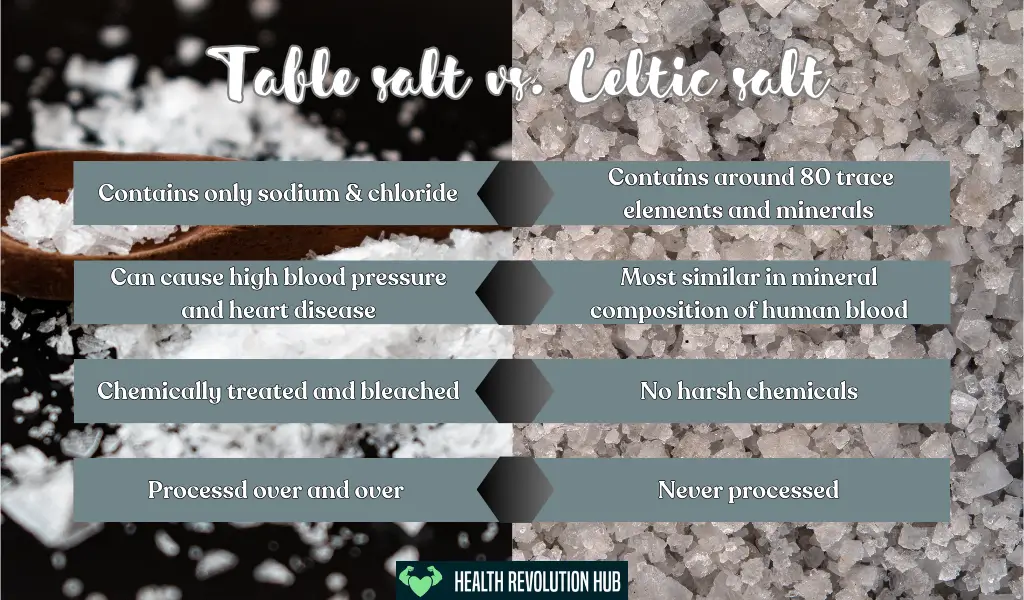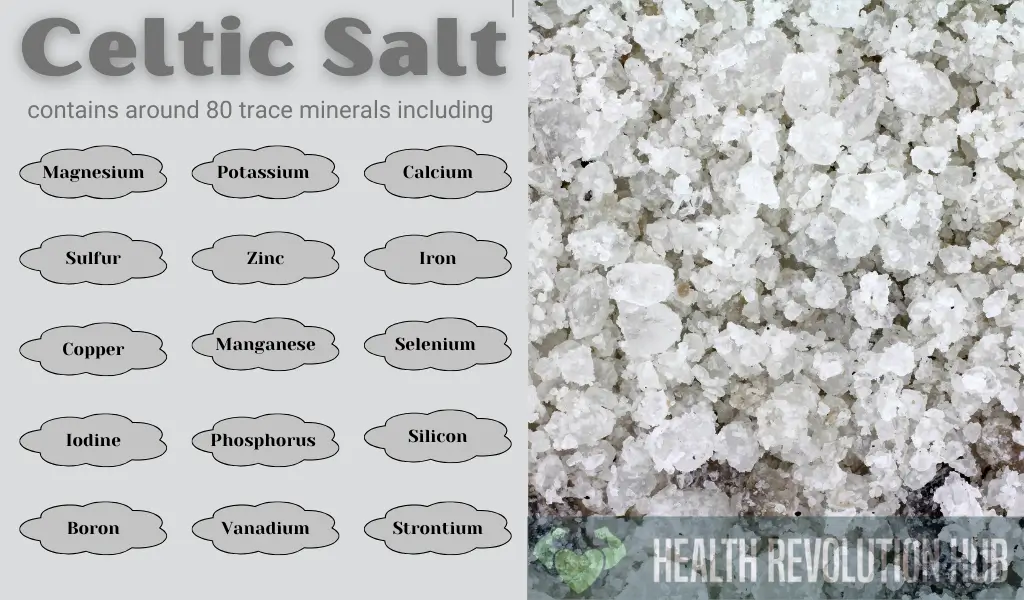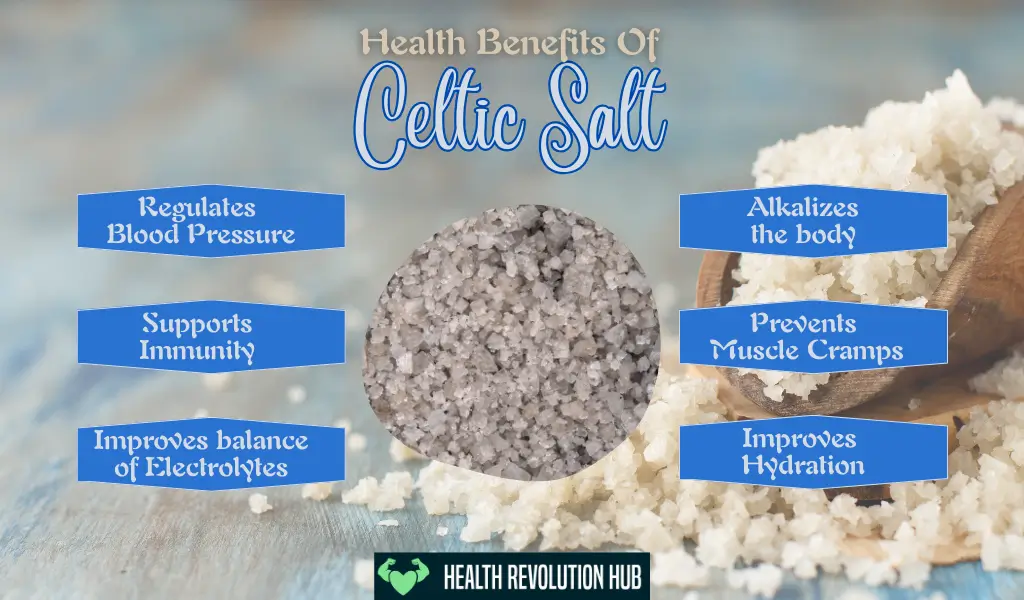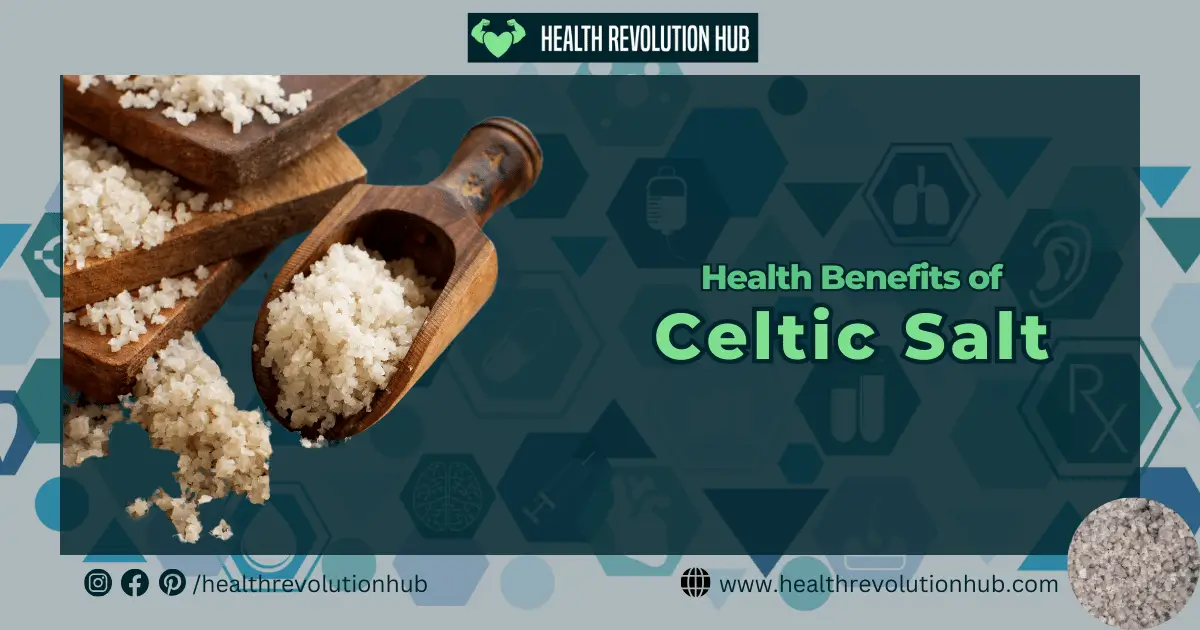Introduction
Unlike ordinary table salt, Celtic salt boasts a rich blend of essential trace minerals that could redefine the way you think about seasoning. By understanding this salt’s origins and nutritional value and exploring the Celtic salt benefits you’ll soon realize why it is gaining popularity among health-conscious individuals. I will also touch upon its culinary uses and address some frequently asked questions to provide you with a holistic understanding of this exceptional salt.

What Is Celtic Salt?
Celtic salt, often referred to as sel gris or gray salt, is a unique type of unrefined sea salt that originates from the coast of France. Unlike table salt, which undergoes a refining process that removes impurities and essential minerals, Celtic salt is harvested using traditional methods, allowing it to retain its natural mineral content. This exquisite salt is known for its beautiful gray color, derived from the clay beds where it is harvested.
The Nutritional Value of Celtic Salt
One of the critical reasons why Celtic salt stands out is its exceptional nutritional profile.
While the exact composition of Celtic salt can vary depending on its source and harvesting methods, it typically contains around 80 or more different trace minerals and elements. Some of the most common trace minerals found in Celtic salt include:
Trace Minerals and Their Importance
- Magnesium: Celtic salt contains magnesium, which is vital for muscle function, nerve function, and bone health. Magnesium is involved in over 300 enzymatic reactions in the body.
- Potassium: Potassium, also found in Celtic salt, regulates blood pressure, supports heart health, and helps maintain proper muscle and nerve function.
- Calcium: Calcium, another essential mineral in Celtic salt, is crucial for strong bones and teeth. It also plays a role in blood clotting and muscle function
- Sulfur: Supports joint health and detoxification processes in the body.
- Zinc: Plays a role in immune function, wound healing, and DNA synthesis.

Trace minerals are essential for various bodily functions, supporting everything from bone health to nerve function and immune system regulation. By incorporating Celtic salt into your diet, you can ensure that your body receives these vital nutrients in a natural and balanced way.
Sodium Content
It is worth noting that while Celtic salt does contain sodium, it is not necessarily a cause for concern. In fact, the sodium content in this unrefined salt is lower than that of table salt, which makes it a healthier choice for those aiming to reduce their sodium intake.
Celtic Salt Benefits

Now, let’s explore some of the specific benefits that Celtic salt brings to the table.
Improved Hydration
Maintaining proper hydration is crucial for overall health, and Celtic salt can play a significant role in this aspect. Due to its osmotic balance, this salt helps the body absorb and retain water more efficiently. By promoting optimal fluid balance, Celtic salt reduces the risk of dehydration, which can lead to fatigue, muscle cramps, and other unpleasant symptoms.
Balanced Electrolytes
Electrolytes, including sodium, potassium, and magnesium, are essential for numerous bodily functions. They help regulate nerve and muscle function, maintain proper fluid balance, and support cellular processes. Celtic salt, with its rich mineral content, provides a natural and balanced source of electrolytes. This makes it particularly beneficial for athletes and individuals engaging in rigorous physical activities, as it aids in replenishing electrolyte levels and preventing muscle cramps and fatigue.
Lower Sodium Intake
Excessive sodium consumption is a known risk factor for high blood pressure, which can increase the likelihood of heart disease and stroke. By opting for Celtic salt as a healthier alternative to table salt, you can reduce your sodium intake without compromising on flavor.
Incorporating this salt into your diet, along with adopting other sodium reduction strategies such as avoiding processed foods and reading labels, can have a positive impact on your blood pressure and overall cardiovascular health.
Enhanced Digestion
Celtic salt possesses alkalizing properties, which can help balance the acidity levels in your digestive system. This, in turn, promotes better overall digestive health. It’s like a soothing balm for your digestive woes. By supporting the body’s natural pH balance, Celtic salt can aid in reducing acidity-related issues such as acid reflux, heartburn, and indigestion.
Additionally, its mineral-rich composition can contribute to the proper absorption of nutrients, further enhancing digestion.
Culinary Uses of Celtic Salt
Beyond its health benefits, Celtic salt is also highly regarded for its culinary uses. Its coarse texture and unique taste add a delightful dimension to various dishes. Whether used as a finishing touch on a perfectly seared steak or incorporated into baked goods to elevate their flavors, this salt brings a depth of flavor that is difficult to match. Moreover, its mineral content lends a subtle complexity to any dish, enhancing the overall dining experience.
Celtic Salt FAQs
Now, let’s address some frequently asked questions regarding Celtic salt to ensure a comprehensive understanding:
A. Is Celtic salt healthier than table salt?
Yes, Celtic salt is generally considered healthier than table salt. With its unrefined nature and mineral-rich composition, it provides valuable trace minerals alongside lower sodium content.
B. Can Celtic salt help with weight loss?
While Celtic salt itself does not directly facilitate weight loss, it can be a beneficial component of a balanced diet. Its lower sodium content promotes better fluid balance and helps reduce bloating, indirectly supporting weight loss efforts.
C. Are there any risks associated with Celtic salt?
As with any salt, moderation is key. While Celtic salt offers numerous health benefits, excessive consumption could still contribute to sodium-related health issues, especially in individuals with pre-existing conditions. It is essential to consult a healthcare professional for personalized advice.
Related Topics Health benefits of avocado








